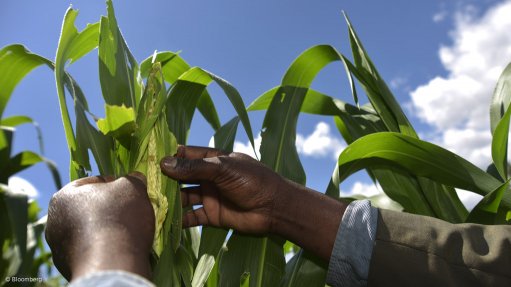
FOOD INSECURITY Food is heavily reliant on water supply. Scarce water supply puts crops and livestock at risk
Photo by: Bloomberg
The growing funding gap to keep up with the rehabilitation, operation and maintenance of ageing water infrastructure is a global concern, particularly in the current age of austerity, says global engineering firm Aurecon.
The firm emphasises that new water systems need to be built to cope with increasing populations, shifting consumption patterns, improving technologies, an uncertain future and a changing climate.
“This is the only way we can guarantee the security of our water in the complex times of our future,” say Aurecon water resources design director Dr Verno Jonker.
To tackle the outlined challenges, he suggests that there must be a global mindset change. “We need to create new sustainable and resilient water realities, based on a comprehensive understanding of problems, imaginative approaches, cooperation, new paradigms, and new technologies.”
In a South African context, Aurecon’s studies indicate the critical importance of constructing integrated bulk water supply infrastructure to mitigate negative impacts associated with limited water supply. This is already seen in the Western Cape’s forced Level 4 water restrictions, which have meant households and businesses have had to take extreme and immediate action to comply with critical water-saving measures.
“Almost every day, there are constant reminders of the increasing scarcity of water and the importance of managing this essential natural resource in the face of increasing demands, degrading environmental conditions and climate change,” says Aurecon water resources engineer Dr James Cullis.
The Value of Water
Cullis explains that clean, safe drinking water is an important prerequisite for life, the environment and healthy living. He adds that, while many countries globally spend up to 20% of their national budgets on healthcare, investment in quality water supply remains inadequate.
“Globally, 1.1-billion people still do not have access to safe drinking water, and 2.6-billion people – half of the developing world – lack even basic sanitation facilities.”
As a result, Jonker reveals that four out of five illnesses in developing countries have been linked to poor water and sanitation, and one death in five of children under the age of five worldwide is related to waterborne diseases. Even in developed countries, a lack of attention to the protection of critical water supply sources can have significant human health implications.
“Food is also dependent on water and without water security, crops and livestock are put at risk,” he points out.
He further highlights that, by 2050, it is expected that food production will demand 20% more water than it currently does, owing to the increase in global standards of living and the trend towards diets consisting of meat and dairy products.
“The amount of water required in the cultivation and production of food and other products is significant. It takes 600 ℓ of water to produce 500 g of wheat, 1 000 ℓ of water for 1 ℓ of milk, and 4 600 ℓ to produce one 300 g beef steak.”
Water as a Catalyst for Peace
Moreover, Cullis explains that one of the greatest challenges for the future is how to ensure sufficient and sustainable water supply for a growing global population in excess of seven-billion. Sustainable water resources management requires collaborative partnerships among diverse stakeholders.
The human right to water and sanitation acknowledges water as a shared resource, which brings with it complex hydrological, social, environmental and economic interdependencies, notes Cullis.
“Our growing world will demand more water and generate more pollution. This impacts and threatens ecosystems, water sustainability, peace and security. This, in turn, threatens the future and certainty of the world’s water supply.”
Water supply risks are exacerbated by inadequate infrastructure spending, maintenance and poor management and governance. However, Jonker postulate that this could be a necessary catalyst for improved cooperation between countries, especially in regions such as Africa, with 59 transboundary river basins.
The challenge of ensuring that water infrastructure is invested in and maintained is integral to water security. The value of water is only known when it is no longer accessible, he concludes.